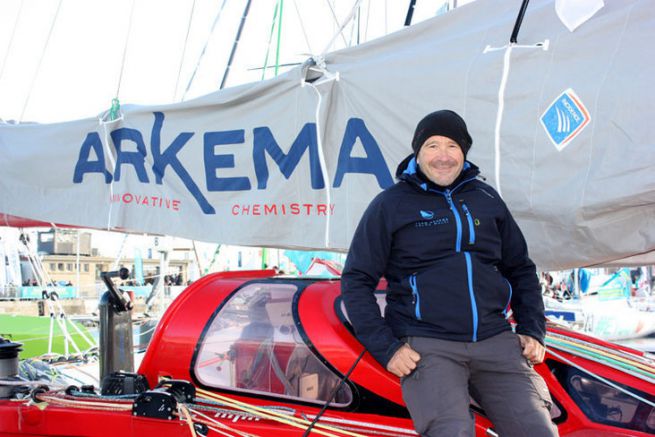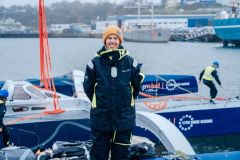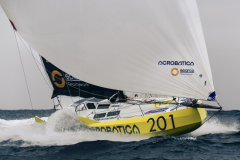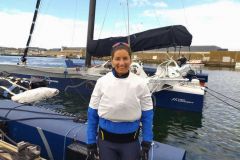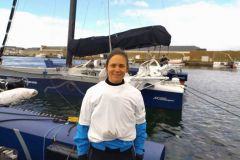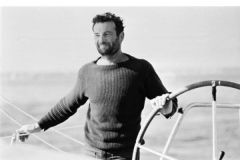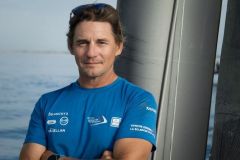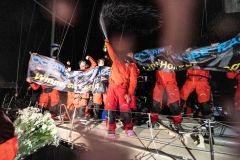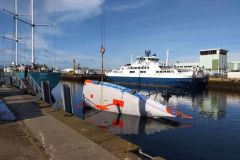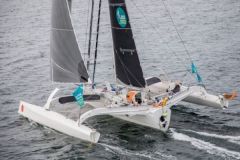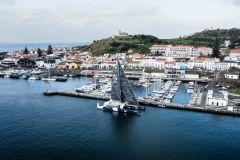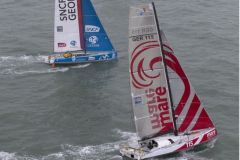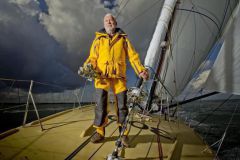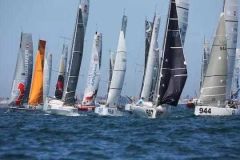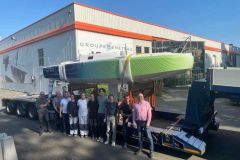What is the objective for you on this Route du Rhum?
The goal is already to arrive in Guadeloupe. You don't go on a deckchair to stop because you broke a nail. You have to go to the other side already. We've been sailing since Rum 2014 in preparation for Rum 2018, trying to optimize and perform to go as fast as possible. We have a boat totally ready. If we can go scratch an extra podium, or even a first place, I'm not going to deprive myself.
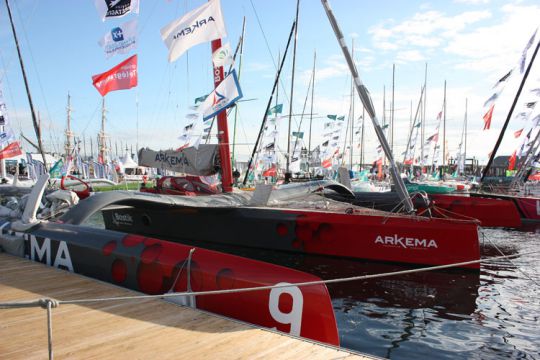
Can you introduce us to your boat?
I spend a lot of time at the helm. We only have one protective glass that I pass from one side to the other. It is a plexi developed by one of our partners that can bend cold. It's resistant and it saves a lot of weight. Downwind I don't put the glass on, it's only to protect me at reaching.
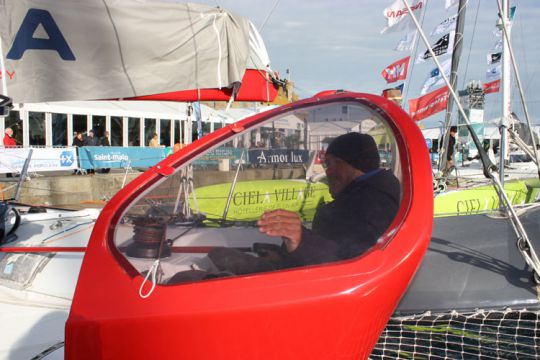
I have Garmin instruments on the link arm: heading, speed, real and apparent wind direction, wind strength. I have a return to the helm station and another on the screen inside the cockpit.
I have the traveller[mainsail trolley] at hand and I can bring a listening device next to me to shock in an emergency.
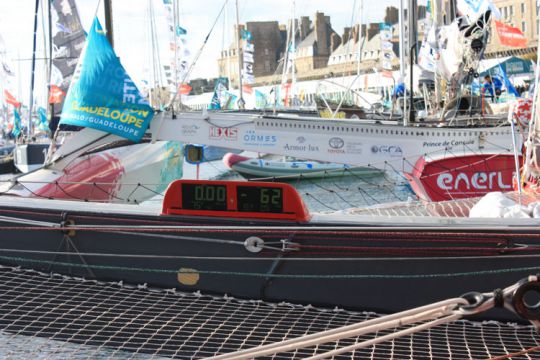
To rest, I sit on a chick in the little cabin. But I can't stretch my legs without putting them in the bucket at the end. I almost never go down there. Just to fetch water, food or to carry the weights longitudinally. I have a small protection on the slide to limit the return of the wind. It is the same plexiglass as at the steering station, folded and cold-formed. But in any case life on board remains sporty!
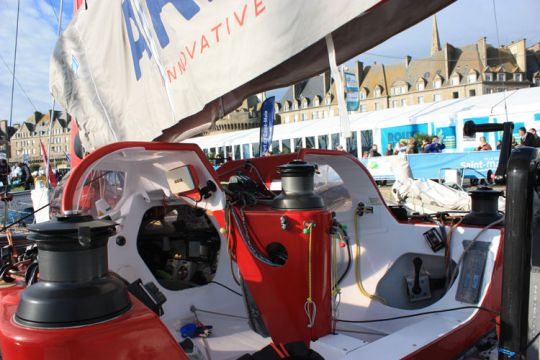
On the Jacques Vabre[double-handed race], the first night there was wind, Alex[his partner] wanted to sleep in it. I say to him: "You won't stay there long", he answers me: "If you worry". So he takes the bitch down and starts sitting inside on the back. Impossible, too much speed, too much stress, you're a few millimeters from the water. So he's going to install himself on the engine hood. He takes off a couple of times, he's up. We ended up like dogs in a doghouse.
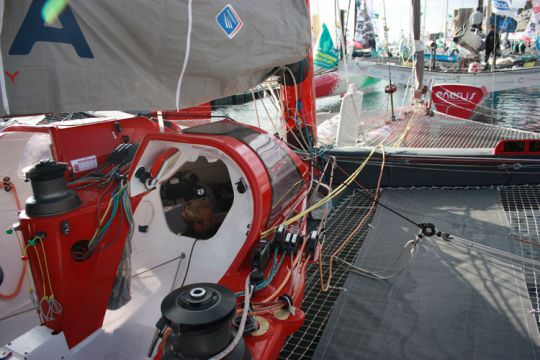
What have you optimized since the last Route du Rhum?
The boat is in a new version. In terms of manoeuvring, the reel has been optimized to eliminate all friction from the furlers. We have complete control over the settings of the boat's quest. It's a real big evolution. We changed the rudders. We have foils, it's a big change. The sails are new, very beautiful. They're coming out of Incidence in La Rochelle. They are DFI sails, the whole range from gennak' to code 0 and J3, everything is in the last DFI membrane. We're really happy about it.
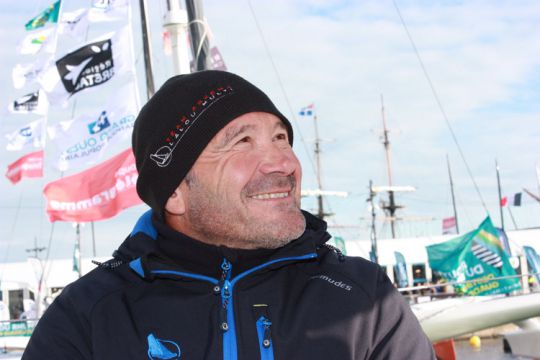
We also have a small weapon that could prove formidable: Madintec's Bravo. There are only three of us on the Route du Rhum: Macif, Sam Davies and us. It's a whole new generation of pilot. It is a power plant that comes directly from the America's Cup and accepts any type of equipment: Garmin, B&G, NKE... We took what we thought was best in terms of electronics. It is amalgamated on a power plant and it allows to have a feedback on the pilot much faster and more concise on the instructions. And there is the pilot developed by Madintec. We almost had him on the last Jacques Vabre, but he wasn't ready enough for us to leave with it. This year we worked with them to develop this pilot. It really works exceptionally well. He is able to relaunch, to understand whether he is upwind or downwind. If the boat is lying down it will luff until it is at the required angle. Downwind he will do the same by slaughtering. Our boats are super light, the helm is essential to get back on track and go fast. Everything is controlled by an application on a Crosscall smartphone[rugged phone].
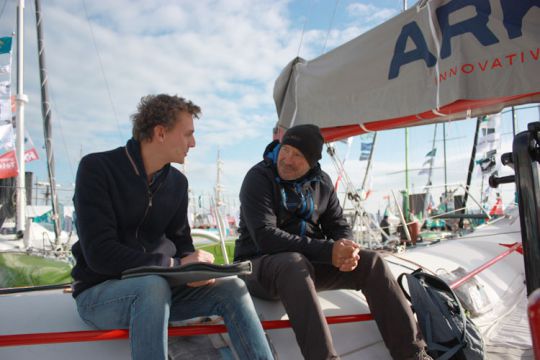
The advantage is that we mix apparent wind and reality. He will always try to keep the apparent wind angle. On most pilots today, they exceed the angle, so the boats accelerate, the pilot will go down, get stuck before putting the angle back behind. Now we're much thinner. We have a nice autopilot, but it's a proto so we have to validate some things.
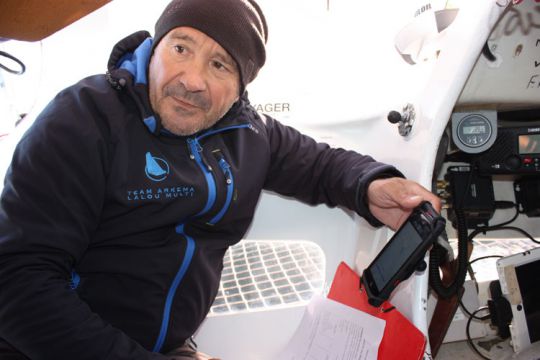
Next year we're going to do 2-3 things that I'm not going to tell you right now, but I have an idea for the next boat. We would like to propose load-bearing plans for rudders in the Multi50 class. We're going to do some tests next year. It's not a big change, but it would make it possible to regulate the boat in longi. We pitch up quite a bit and lack a little acceleration and longitudinal stability.
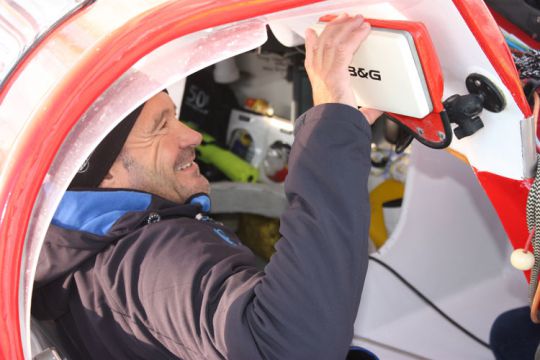
Could you tell us about your best memory on a Route du Rhum?
This is going to be my four e . The fabulous moment is the arrival. It's extraordinary. The Guadeloupeans have taken over the Route du Rhum. It's THEIR race. Most of the time, we arrive in places where people are not very concerned. In Brazil, for example, no one knows what is going on. When you arrive in Guadeloupe, people welcome you. That's really great.
At each Route du Rhum I had an extraordinary welcome. You walk through people's hedges, they offer you drinks. You get on the podium you're already shifted. It's festive.
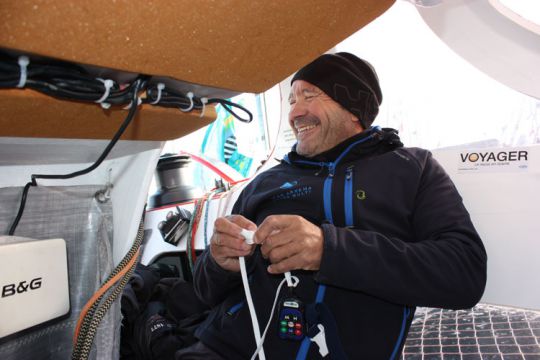
Could you describe the Route du Rhum in two words?
It's the "multihull race". It's a sprint on the Atlantic in a Multihull.
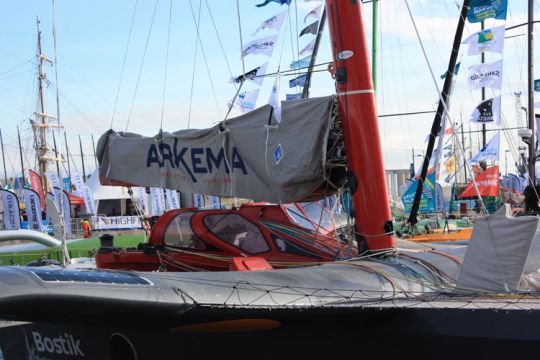
For you and this boat, what will be the difficulties of the course? In terms of weather, strategy or personally?
It is the passage through the Bay of Biscay that will be the most difficult. With Cape Finistère, which we must manage successfully and pass as quickly as possible. It might be pretty fast in the first 48 hours. That's where we have the most traffic and shit in the water. We can also have a really rotten sea, especially with the weather they announce. This is really the place to be careful.
